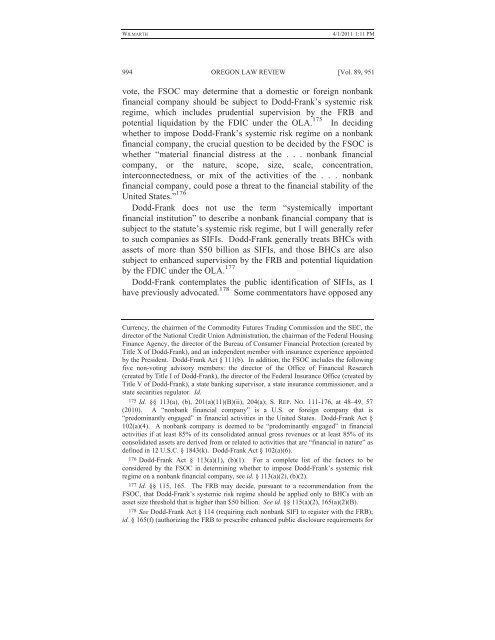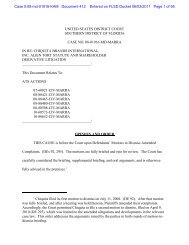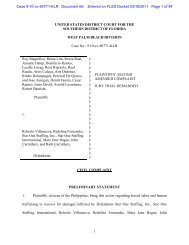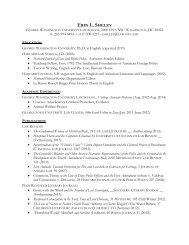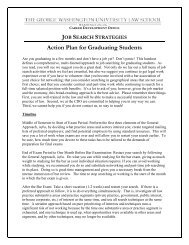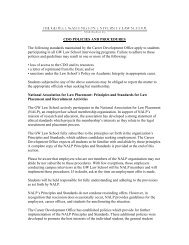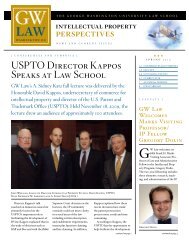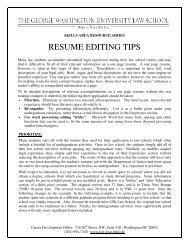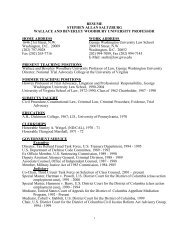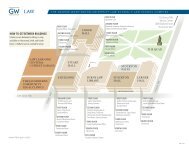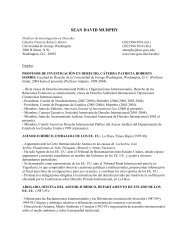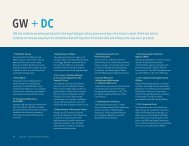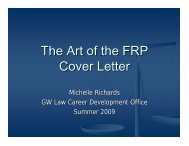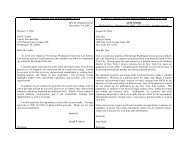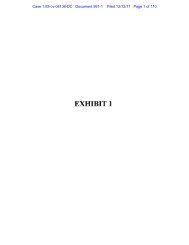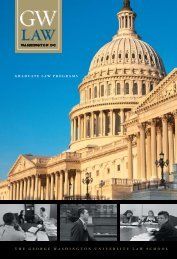CLE Materials for Panel #1 - George Washington University Law ...
CLE Materials for Panel #1 - George Washington University Law ...
CLE Materials for Panel #1 - George Washington University Law ...
Create successful ePaper yourself
Turn your PDF publications into a flip-book with our unique Google optimized e-Paper software.
WILMARTH<br />
4/1/2011 1:11 PM<br />
994 OREGON LAW REVIEW [Vol. 89, 951<br />
vote, the FSOC may determine that a domestic or <strong>for</strong>eign nonbank<br />
financial company should be subject to Dodd-Frank’s systemic risk<br />
regime, which includes prudential supervision by the FRB and<br />
potential liquidation by the FDIC under the OLA. 175 In deciding<br />
whether to impose Dodd-Frank’s systemic risk regime on a nonbank<br />
financial company, the crucial question to be decided by the FSOC is<br />
whether “material financial distress at the . . . nonbank financial<br />
company, or the nature, scope, size, scale, concentration,<br />
interconnectedness, or mix of the activities of the . . . nonbank<br />
financial company, could pose a threat to the financial stability of the<br />
United States.” 176<br />
Dodd-Frank does not use the term “systemically important<br />
financial institution” to describe a nonbank financial company that is<br />
subject to the statute’s systemic risk regime, but I will generally refer<br />
to such companies as SIFIs. Dodd-Frank generally treats BHCs with<br />
assets of more than $50 billion as SIFIs, and those BHCs are also<br />
subject to enhanced supervision by the FRB and potential liquidation<br />
by the FDIC under the OLA. 177<br />
Dodd-Frank contemplates the public identification of SIFIs, as I<br />
have previously advocated. 178 Some commentators have opposed any<br />
Currency, the chairmen of the Commodity Futures Trading Commission and the SEC, the<br />
director of the National Credit Union Administration, the chairman of the Federal Housing<br />
Finance Agency, the director of the Bureau of Consumer Financial Protection (created by<br />
Title X of Dodd-Frank), and an independent member with insurance experience appointed<br />
by the President. Dodd-Frank Act § 111(b). In addition, the FSOC includes the following<br />
five non-voting advisory members: the director of the Office of Financial Research<br />
(created by Title I of Dodd-Frank), the director of the Federal Insurance Office (created by<br />
Title V of Dodd-Frank), a state banking supervisor, a state insurance commissioner, and a<br />
state securities regulator. Id.<br />
175 Id. §§ 113(a), (b), 201(a)(11)(B)(ii), 204(a); S. REP. NO. 111-176, at 48–49, 57<br />
(2010). A “nonbank financial company” is a U.S. or <strong>for</strong>eign company that is<br />
“predominantly engaged” in financial activities in the United States. Dodd-Frank Act §<br />
102(a)(4). A nonbank company is deemed to be “predominantly engaged” in financial<br />
activities if at least 85% of its consolidated annual gross revenues or at least 85% of its<br />
consolidated assets are derived from or related to activities that are “financial in nature” as<br />
defined in 12 U.S.C. § 1843(k). Dodd-Frank Act § 102(a)(6).<br />
176 Dodd-Frank Act § 113(a)(1), (b)(1). For a complete list of the factors to be<br />
considered by the FSOC in determining whether to impose Dodd-Frank’s systemic risk<br />
regime on a nonbank financial company, see id. § 113(a)(2), (b)(2).<br />
177 Id. §§ 115, 165. The FRB may decide, pursuant to a recommendation from the<br />
FSOC, that Dodd-Frank’s systemic risk regime should be applied only to BHCs with an<br />
asset size threshold that is higher than $50 billion. See id. §§ 115(a)(2), 165(a)(2)(B).<br />
178 See Dodd-Frank Act § 114 (requiring each nonbank SIFI to register with the FRB);<br />
id. § 165(f) (authorizing the FRB to prescribe enhanced public disclosure requirements <strong>for</strong>


